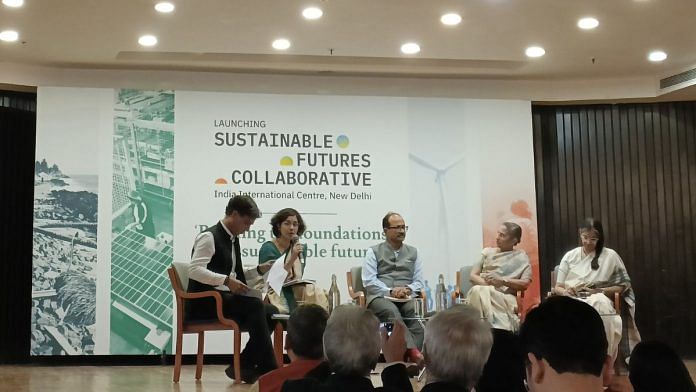New Delhi: The Sustainable Futures Collaborative (SFC), a new research organisation dedicated to environmental and climate policy, was launched at the India International Centre in New Delhi Tuesday. Headed by Senior Fellow Navroz K. Dubash, the SFC is overseen by four other Fellows — all of whom have prior affiliations with the Centre for Policy Research (CPR) — each leading distinct research streams.
“There is a vacuum in Indian dialogue where most of the work on climate change is ad-hoc, not peer-reviewed and not deeply researched. SFC will fill that vacuum,” said keynote speaker Dr N.K. Singh, Rajya Sabha Member and former Chairperson of the Fifteenth Finance Commission, at the launch.
He added that even in the global discourse, what is missing from climate change research is the perspective of a “large, populous state on the cusp of becoming a middle-income country like India.”
SFC aims to fill that gap.
Speaking at the launch event, Dubash underscored SFC’s commitment to a multidisciplinary approach, guided by an “India-focused yet globally aware” position, which sets them apart from other organisations in the field. The research streams within SFC include ‘adaptation and resilience’, ‘climate policy’, ‘energy transitions’, and ‘environmental governance and policy’.
Dubash also highlighted the motivation behind the inception of the think tank — the belief that “sustainable development and job creation can go hand in hand”.
While renewable energy and green sectors were once viewed as sunrise sectors, today, environment and sustainability hold a central place in mainstream policy discussions.
Bhargav Krishna, a Fellow and coordinator of the environmental governance and policy stream, spoke about SFC’s vision, which involves a departure from a mere ‘carbon-centric’ approach to climate change towards a more holistic, development-based approach. Their focus, he said, would be on fostering collaborations with governments, civil society, and academic institutions to carry out their work, and not merely work as “just another think tank”.
SFC also released four policy papers on its research streams to outline their perspective and approach towards these issues.
At the panel discussion that followed, Aditya Valiathan Pillai and Shibani Ghosh of SFC, spoke about the different pathways India can take towards ‘building a sustainable future’. Others, including Kamal Kishore of NDMA, Kalpana Balakrishnan of WHO-collaborating centre Srihar and Aparna Uppaluri of Tata Trusts, participated in the discussion too.
Uppaluri spoke about the pivotal moment India is facing as it emerges as a global leader in setting norms for climate change action. “Organisations like SFC are even more pertinent now to help deepen institutional architecture and systems of climate financing in the country,” she said.
SFC currently has over 15 members, and an advisory board of six members chaired by Dubash. The board, which includes Uppaluri, also has scholars like Sharachchandra Lele of Ashoka Trust for Research in Ecology and the Environment (ATREE) and Dr Soumya Swaminathan, head of the MS Swaminathan Research Foundation.
The other partners and collaborators of SFC include the Rainmatter Foundation, a Bengaluru-based non-profit organization on climate change founded by Nikhil Kamath and Kailash Nadh of Zerodha; Asar, a research and advocacy organisation; and Prayas Energy Group.
Speaking to ThePrint, Bhargav Krishna said that SFC was already working on a project with the World Research Institute (WRI) and Prayas Energy Group on energy transition, and adaptation and resilience. “We have been functional for the past six months, but waited to launch because we wanted to supplement our ideas and pathways with concrete work that we’ve done and perspectives for the next few years that we’ve planned,” said Krishna.
(Edited by Zinnia Ray Chaudhuri)
Also read: Indian winters warmer now than in 1970, but Delhi saw least rise in temperatures, shows US study



